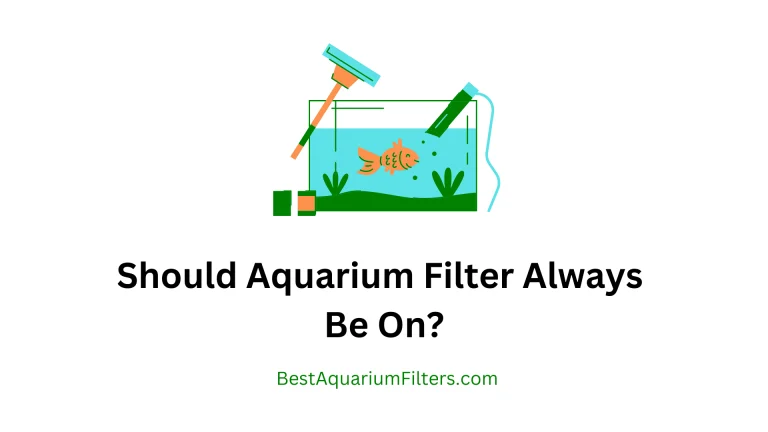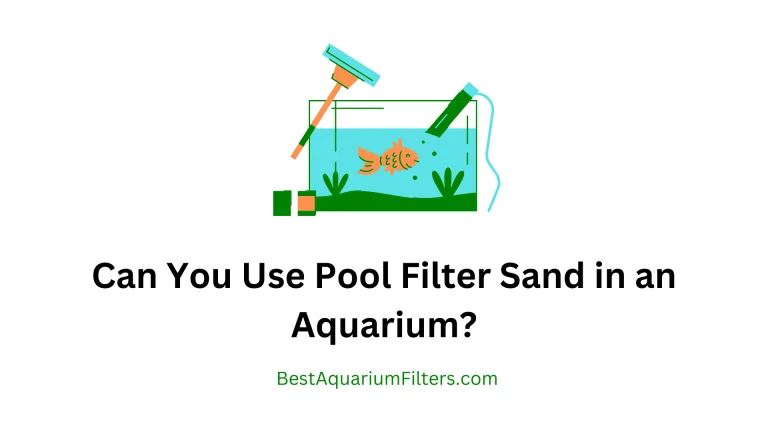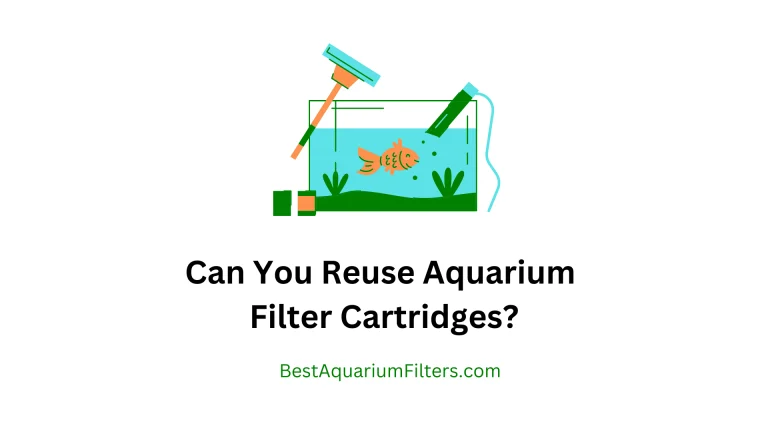How Often to Change Aquarium Filters?
Keeping fish happy and healthy in an aquarium involves taking good care of the water they swim in. A big part of this is having a filter.
Filters help clean the water by getting rid of dirt and bad stuff. But just like changing the oil in a car, filters need regular attention, too. Many people wonder how often they should change their aquarium filter.
In this article, we’ll talk about how often to change aquarium filters and cover everything you need to know about it.
How often do you change different aquarium filter media?
Mechanical Filtration Media
Mechanical filters in fish tanks catch gunk and dirt floating around in the water.
They use things like sponges or mesh screens to trap the yucky stuff, like leftover food and fish waste. But if we don’t clean or change these filters often, they can get clogged up and stop working well.
So, we need to clean or replace them every 2-4 weeks to keep the water clean and healthy for the fish.
Biological Filtration Media
Biological filters in fish tanks help good bacteria grow. These bacteria are super important because they turn harmful stuff like fish waste into less harmful substances.
They live on special materials in the filter, like ceramic rings or bio-balls. Unlike the filters that catch dirt, we shouldn’t change these biological filters often.
Instead, we just need to rinse them gently with special water when they get too dirty. Replacing them completely could mess up the balance in the tank and harm the fish.
Chemical Filtration Media
Chemical filters in fish tanks help clean the water by removing bad stuff that’s dissolved in it.
They use things like activated carbon or special resins to do this job. Activated carbon is really good at soaking up things like bad smells or leftover medication. But these filters need to be changed regularly because they get filled up with the stuff they soak up and stop working well.
How often you need to change them depends on things like how many fish you have and what’s in the water. Usually, activated carbon must be changed every 2-4 weeks, but other filters might have different schedules.
It’s a good idea to check the water regularly to see when it’s time to change them.
Factors Affecting Filter Change Frequency
Type of Filter
Various aquarium filters work differently to keep the water clean. Sponge filters, for instance, mostly catch debris but may need cleaning more often because they trap smaller bits.
Canister filters can hold more stuff, so they might not need cleaning as often. Knowing how your filter works helps you figure out when to clean or change it.
Tank Size and Stocking Levels
The size of your fish tank and how many fish you have affect how much waste builds up and how hard your filter has to work.
Bigger tanks with more fish usually mean more waste, so you must clean your filter more often. Too many fish in your tank can stress out your filter and make it harder to keep the water clean.
Make sure your filter can handle the size of your tank and how many fish you have to keep the water clean, and reduce how often you need to clean the filter.
Type of Fish and Their Waste Production
Different types of fish create different amounts of waste because of how they breathe and go to the bathroom. Fish like goldfish or cichlids, which are pretty active, make more waste than fish that move slower or grow more slowly.
Also, bigger fish make more waste than smaller ones. Knowing how much waste your fish makes can help you plan how often to clean your filter.
If you have fish that make a lot of waste, you should clean your filter more often to keep the water clean and your fish healthy.
Water Parameters and Quality
The condition of your fish tank water, like how much ammonia, nitrite, nitrate, pH, and temperature it has, affects how healthy your fish are and how well your filter works.
Too much ammonia or nitrite can hurt your fish, and your filter isn’t handling waste well. It’s essential to check these levels often to catch problems early and adjust how often you clean your filter.
Other things like water hardness, alkalinity, and oxygen levels also matter and might need changes to your cleaning routine to keep your filter working right.
Signs It’s Time to Change Your Aquarium Filter
Decreased Water Flow
A clear sign you need to change your aquarium filter is when the water flow slows down. If you notice that the water coming out of the filter isn’t as fast as usual, it might mean that the filter material is getting clogged with dirt or waste.
When the flow slows, the filter can’t clean the water as well, and it can create spots in the tank where waste builds up because the water isn’t moving properly.
Accumulation of Debris
If you see a lot of dirt or waste building up around your aquarium filter’s intake or outflow parts, it’s another sign that your filter needs care.
This buildup means that the mechanical part of the filter, which catches dirt, is getting full and can’t hold anymore. Checking these areas often and cleaning or changing the filter material when you see buildup helps keep the filter working well.
Increased Ammonia or Nitrite Levels
If you find high ammonia or nitrite levels in your aquarium water, it could mean there’s a problem with your filter. These substances are harmful to fish and can make them sick or even kill them if they’re not fixed quickly.
Testing your water regularly, especially for ammonia and nitrite, helps you catch any significant changes that might mean your filter isn’t working right to clean the water.
Foul Odor
If your aquarium water starts to smell bad, like rotten eggs, it’s a sign that there’s too much waste in the water and it’s not clean. This smell comes from things breaking down or bacteria working without oxygen, which can hurt your fish.
To fix it, you need to clean or change your filter, do some partial water changes, and ensure it is doing a good job cleaning the water.
Visual Inspection of Filter Media
Looking at your aquarium filter regularly can tell you if it needs fixing or changing. Check the mechanical part, like sponge pads or filter floss, for any signs of being full or falling apart.
Also, look at the biological part, like ceramic rings or bio-balls, for any weird colors or slime or if they’re not as good for bacteria to grow on. Fixing any problems you see when you check your filter helps keep your fish healthy and happy.
How often to change aquarium filter pads?
How often you change your aquarium filter pads can depend on things like how big your tank is, how many fish you have, what kind of filter you use, and how clean your water is. Usually, it’s a good idea to switch out the mechanical filter pads every 2 to 4 weeks or when they look really dirty or clogged.
Keep an eye on your filter pads regularly. If the water doesn’t flow as well as before or if the pads look super dirty, it’s time for a change. If you have lots of fish in your tank or if you still see a lot of gunk, even with regular cleaning, you might need to change the pads more often.
Just remember, keeping your filter pads clean helps keep your fish healthy and your water clean!
Conclusion
This article talked about how often to change aquarium filters in your fish tank. It explained that filters help keep the water clean for your fish by getting rid of dirt and bad stuff. It said that different types of filters need to be changed at different times.
For example, filters that catch dirt should be changed every 2 to 4 weeks, while filters that help good bacteria grow should only be rinsed gently when they get dirty.
The article also said that factors like the size of your tank, how many fish you have, and the type of fish you have can affect how often you need to change your filter. It mentioned signs to look out for, like slow water flow or bad smells, that indicate it’s time to change your filter.
Lastly, it gave advice on how often to change the pads in your filter and why it’s important to keep them clean for your fish’s health.






